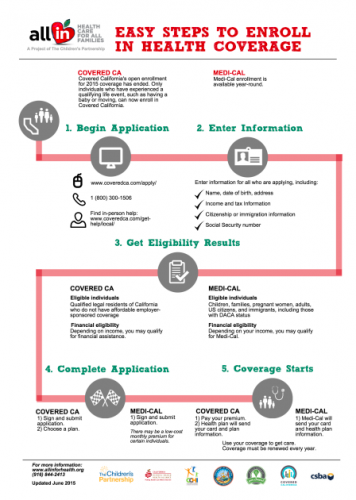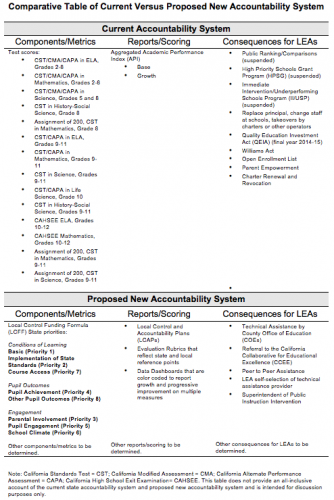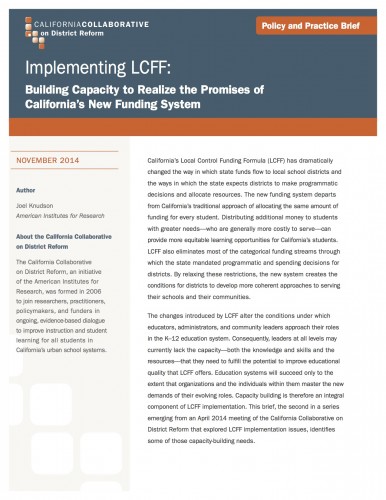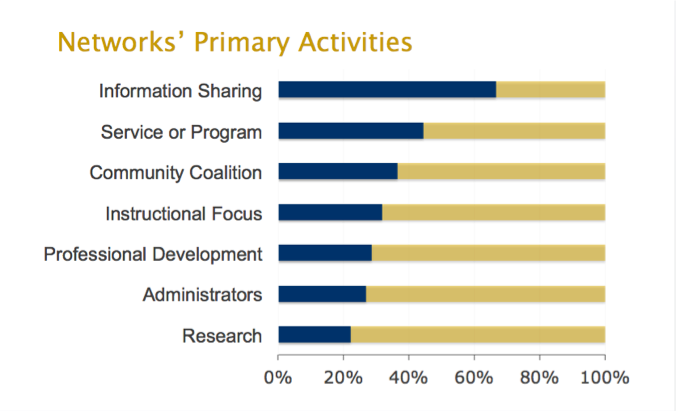CISI Resources & e-Bulletins
State Board of Education Draft LCAP Rubric (March 2015)
District Leadership
Summary — Unpacking the SBE Agenda
In March 2015, the State Board of Education (SBE) voted to suspend the API for 2014-15 as the state develops a new accountability system. The California Department of Education (CDE) recommends that the SBE approve the PSAA Advisory Committee report and provide recommendations on the following:
LCAP Analysis: School Climate in California
District Leadership
LCAPs Show Districts Focusing on School Climate in California Schools, But Still Much Work to Be Done
Local Control and Accountability Plans (LCAP) encourage school districts to reform school discipline practices and improve school climate in support of the eight state priorities. According to the national anti-crime organization Fight Crime, in an analysis of California’s LCAPs:
LCAP Electronic Template Field Test
District Leadership
County offices of education and school districts interested in
participating in the field test of the 2015-16 LCAP electronic
template are asked to contact Local Agency Systems Support Office
(LASSO) staff by telephone at 916-319-0809 or by e-mail at
lcff@cde.ca.gov and to provide a contact name, telephone number,
and email. Participants will be notified not later than Friday,
March 20, 2015, and additional information and documentation
regarding the field test will be sent out shortly thereafter.
CA State Board of Education Approves LCFF Regulations and LCAP Template
District Leadership
The California State Board of Education approved the Local
Control Funding Formula (LCFF) regulations and Local Control
and Accountability Plan (LCAP) template at the November 14,
2014 meeting.
On November 2, 2016, the State Board of Education approved an
updated LCAP template.
2015-2016 LCAP Approval Manual from CCESSA
District Leadership
The California County Superintendents Educational Services Association (CCSESA), in collaboration with BASC, CISC and other state agencies, has released the 2015-16 edition of the LCAP Approval Manual. The manual provides a guide for county offices of education to use in their LCAP oversight approval process.
Towards a Grand Vision: Early Implementation of California’s LCFF
District Leadership
A report written by Daniel C. Humphrey and Julia E. Koppich and released by SRI International emphasizes key areas of growth in our state’s education system, as LCFF and CCSS are implemented. Following are excerpts from the report, summarized in a recent EdSource article: “The LCAP process really pushed the emphasis on collaboration. We recognized that people were working in silos.
LCFF Implementation: Building Capacity to Realize the Promises
District Leadership
Policy and practice brief from the California Collaborative on District Reform
This November 2014 policy brief highlights new areas of opportunity for school improvement. The report states that under LCFF, central office teams accustomed to implementing categorical programs must evaluate and design strategies that are based on evidence of effectiveness and alignment with district goals, not with state mandates.
California’s New Accountability System: PSAA Report to SBE
District Leadership
The December 2014 PSAA Report to the State Board of Education describes the main aims of the State’s developing accountability system. Below we summarize key aspects.
Supporting Continuous Improvement in California’s Education System (LCFF)
District Leadership
PACE Report | January 2015 | Authors: Linda Darling-Hammond & David Plank
This January 2015 report from Policy Analysis for California (PACE) provides a detailed outline of how California should establish a new accountability system under LCFF.
California Governor’s K-12 Education Budget 2015-2016
District Leadership
The 2013 Budget Act provided $1.25 billion in one‑time Proposition 98 General Fund to support the implementation of the Common Core state standards. The 2015-16 Budget proposes more than $1.1 billion in discretionary one‑time Proposition 98 funding for school districts, charter schools and county offices of education to further their investments in the implementation of Common Core.
California State Budget Update — May Revision News
Legislation & Policy
The California May Budget revision released on May 14, 2015
estimates an additional $6.7 billion in revenues above January
proposal estimates. In total, $5.5 billion will go to K-12 and
community colleges.
AB 2706: Healthcare Information Requirements
Legislation & Policy
(Cabinet Report — July 7, 2015)
 Legislation signed last fall by
Governor Jerry Brown requires school districts and charter
schools to add an informational item to their enrollment forms
aimed at educating parents and legal guardians about available
healthcare options and where they can get help signing
up. The new mandate includes 2015-2016 school year as well
as those beginning in 2016 and 2017.
Legislation signed last fall by
Governor Jerry Brown requires school districts and charter
schools to add an informational item to their enrollment forms
aimed at educating parents and legal guardians about available
healthcare options and where they can get help signing
up. The new mandate includes 2015-2016 school year as well
as those beginning in 2016 and 2017.
PPIC Statewide Poll on Californians and Education
Legislation & Policy
The recent survey of California voters showed 66% support for a school facility bond on the November 2016 ballot. Meanwhile Governor Jerry Brown continues to oppose a bond that would compete with the water bond. “Our polling consistently shows that local school funding is the top priority,” said Mark Baldassare, PPIC’s president and pollster.
Federal Student Meal Program Expansion
Legislation & Policy
Cabinet Report — August 25, 2014
The CEP program streamlines the paperwork and reporting process for parents, schools and districts, and virtually eliminates backups in school lunch lines because no money has to be collected. Families do not need to turn in free and reduced-price meal applications, and schools do not need to process applications or conduct verification. More information from the USDA’s Food and Nutrition Service.
State Board of Education Update
Legislation & Policy
Cabinet Report — July, 9, 2015
In a recent article, Sue Burr, member of the state board of education addressed the question of accountability. She writes: “Our job as a policy making body is to say what are the power indicators that are meaningful at the state level that are reasonable to use to compare across LEAs and charters and will set the expectations and targets that will accomplish all of the guiding principles we want around equity, student performance, graduation, etc. [...] We certainly want to keep faith with what the intent [of the LCFF] was but, again, in my freak-out moment when I saw all of those indicators I had an NCLB nightmare and I just don’t think any of us want to end up there.”
Superintendent of Public Instruction’s Back to School Message
Legislation & Policy
In Tom Torlakson’s August 18, 2015 message to California Educators, several key areas in support of California schools are addressed:
California K12 Collaborative Network Inventory
Research in Brief
Identifying the collaborative educational networks in California is both an art and science. Collaborative networks are diverse, and consequently resist classification. Further, while collaboration may occur in informal settings, only formalized partnerships with a critical mass of coordination or funding establish an online presence. It is this ineffability of educational networks that makes them difficult to identify and leads to duplication of effort as individual institutions work unaware of what other parties strive to accomplish
Accountability for College and Career Readiness
Research in Brief
Developing a New Paradigm
The recently released Stanford Center for Opportunity Policy in Education report entitled Accountability for college and career readiness: Developing a new paradigm provides suggestions for enhancing students’ college and career readiness. The report focuses on areas of accountability for meaningful learning, accountability for adequate and intelligently used resources, and professional capacity.
Teacher Evaluation
Research in Brief
In January 2015 EdVoice released a report evaluating school districts’ policies surrounding evaluation of educators performance entitled “Student Progress Ignored: An Examination of California school districts’ compliance with the Stull Act.” The evaluation requirements of the Stull Act, originally passed in 1971, the report argues, are largely ignored in districts’ current evaluation plans.
Teaching Academic Vocabulary to English Learners
Research in Brief
From the Center for Reform and Research in Education
A new study published in the American Educational Research Journal, December 2014, has shown the benefit of teaching academic vocabulary to children whose first language is not English to support learning English and academic content in English, at the same time.
















